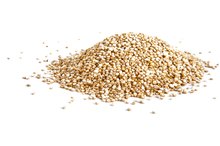Can Eating 1,200 Calories Make You Gain Weight?
Changes in weight are based on a multitude of genetic and lifestyle factors. Some people require extremely high daily caloric intakes, while others need little food at all. Your daily caloric needs are specific to you, and a 1,200-calorie diet will only cause you to gain weight if you do not expend 1,200 calories through daily activity. Understanding how weight gain and loss occurs, and the factors that contribute to metabolism, can help you determine if a 1,200-calorie diet will cause you to gain weight.
Resting Metabolic Rate
Resting metabolic rate, sometimes referred to as basal metabolic rate, is the energy your body requires to perform basic functions, such as breathing and cardiovascular function. Several factors determine your resting metabolic rate, both genetic and lifestyle-based. Your resting metabolic rate accounts for about 60 to 75 percent of your daily caloric needs, according to the National Strength and Conditioning Association's book "Essentials of Strength Training and Conditioning." A 1,200-calorie diet is extremely low, and is likely inappropriate for all but those with the lowest resting metabolic rates.
- Resting metabolic rate, sometimes referred to as basal metabolic rate, is the energy your body requires to perform basic functions, such as breathing and cardiovascular function.
- Your resting metabolic rate accounts for about 60 to 75 percent of your daily caloric needs, according to the National Strength and Conditioning Association's book "Essentials of Strength Training and Conditioning."
Thermic Effect of Food
What Happens to Sugar Levels in the Blood While Fasting?
Learn More
The food you eat influences your energy requirements, as the process of digestion raises your resting metabolic rate by about 7 to 10 percent, according to Jack Wilmore and David Costill's book, "Physiology of Sport and Exercise." This increased rate occurs several hours following a meal, and includes the energy cost of digesting, absorbing, metabolizing and storing food throughout the body. By dividing the 1,200 calories up into four to six smaller meals of 200 to 300 calories, you will keep your metabolism high and reduce the chance of gaining weight.
Physical Activity
Physical activity is the second largest contributor to your daily caloric needs. A more active lifestyle places a greater energy demand on the body and increases the need for calories. Light to moderate activity of 30 minutes will expend roughly 90 to 100 calories. Therefore it is likely that even the most sedentary people expend more than 1,200 calories over the course of the day and will not gain weight from this caloric intake.
- Physical activity is the second largest contributor to your daily caloric needs.
- A more active lifestyle places a greater energy demand on the body and increases the need for calories.
Energy Balance
How Long Will it Take Me to Lose 10 lbs. on a 1,500-Calorie Diet?
Learn More
Fluctuations in weight occur when there is a difference between the number of calories you expend during the day versus the amount of calories you consume through food, referred to as energy balance. If you consume 1,200 calories each day, you will gain weight if you do not expend 1,200 calories through physical activity or just based on your resting metabolic rate. It takes a 3,500-calorie positive energy balance to gain 1 lb. of fat.
- Fluctuations in weight occur when there is a difference between the number of calories you expend during the day versus the amount of calories you consume through food, referred to as energy balance.
Your Caloric Needs
You can determine if consuming 1,200 calories will cause you to gain weight by entering all the individual and lifestyle factors listed above into an online calorie calculator, such as the one provided by MayoClinic.com. Very rarely do people need less than 1,500 calories per day, and only extremely sedentary people need less than 1,200 calories. For example, using MayoClinic.com's calorie calculator, a 70-year-old, 5-foot, 5-inch, 120-lb. woman with little daily activity still needs 1,400 calories to meet her body's nutritional needs.
- You can determine if consuming 1,200 calories will cause you to gain weight by entering all the individual and lifestyle factors listed above into an online calorie calculator, such as the one provided by MayoClinic.com.
Related Articles
References
- "Essentials of Strength Training and Conditioning"; Thomas R. Baechle and Roger W. Earle (eds.); 2008
- "Resources for the Personal Trainer"; American College of Sports Medicine; 2010
- "Physiology of Sport and Exercise"; Jack H. Wilmore and David L. Costill (eds.); 2004
- Blunt K, Dye M. Basal metabolism of normal women. J Biol Chem. 1921.
Writer Bio
Graham Ulmer began writing professionally in 2006 and has been published in the "Military Medicine" journal. He is a certified strength-and-conditioning specialist with the National Strength and Conditioning Association. Ulmer holds a Master of Science in exercise science from the University of Idaho and a Bachelor of Science in psychology from Washington State University.









